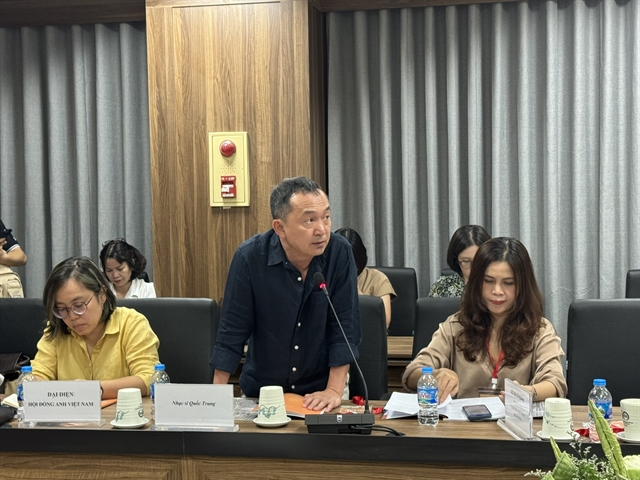 Opinion
Opinion

 |
| Musician Quốc Trung speaks at the seminar on the development of cultural industries in Việt Nam. — Photo bvhttdl.gov.vn |
HÀ NỘI — Experts discussed making contributions to the development of Vietnamese cultural industries and agreed that they need to be financially viable, but they need additional support.
A seminar held on Tuesday Hà Nội heard that Vietnamese identity and spirit needed to be supported with tax exemptions and reductions to get businesses to invest.
The National Strategy for the Development of Vietnamese Cultural Industries until 2020, with a vision to 2030 approved in 2016, is the first national strategy to meet the demand of developing cultural creativity industries.
The strategy has already created positive changes. In 2022, Việt Nam's cultural industries contributed an estimated 4.04 percent to GDP and created one million jobs, according to Nguyễn Thị Thu Phương, Head of Việt Nam National Institute for Culture and Arts (VICAS).
"Many products, events, and cultural and artistic programmes have vividly expressed Vietnamese identity and creative spirit contributing to promoting cultural soft power in international integration," said Phương at the seminar.
Experts expressed their hope that the State could have mechanisms and policies to serve as a pedestal for the cultural industry, specifically creating favourable conditions to support non-state businesses and have tax exemption and reduction policies for these businesses.
"Presently, the State does not have specific support policies for the non-State businesses to develop human resources," said musician Quốc Trung. "While this is an area that requires a long and risky investment.
"Support from the State should be equally divided among inside and outside sectors the State promoting fairness and encourage the non-State businesses which contribute to cultural industries because they also pay taxes and have social responsibility."
Lê Quốc Vinh, president of Le Bros Group said that the State needs to pay attention to supporting and encouraging the businesses to invest into the culture sector.
The private sector creates a driving force to boost cultural industries developing rapidly, so it needs to have a mechanism for the non-State businesses such as tax reduction or appropriate tax rates in daily activities for them, according to Trương Uyên Ly, director of Hà Nội Grapevine art space.
Lecturer Trịnh Lê Anh from Hà Nội Social Sciences and Humanities College said that the output of the cultural industry is tourism and this has been recognised in the world.
"Consuming cultural products is the output of cultural industry and tourism is a method to consume cultural products," Anh said.
To make good use of a cultural industry it needs to have connection between fields and branches of cultural industries and at the same time a policy to support the non-State businesses with clear binding commitments, Anh added.
The seminar was held by VICAS and Ministry of Culture, Sports and Tourism's Copyright Office of Việt Nam with participations from agencies, localities, associations, scientists and relevant businesses. — VNS